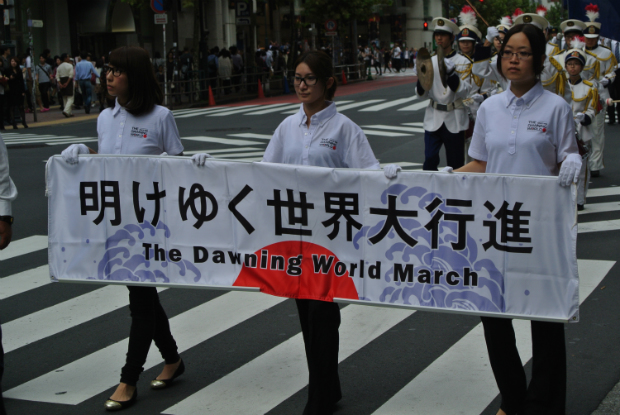At last week’s World Economic Forum, Japanese Prime Minister Shinzo Abe chillingly compared China and Japan’s relations to those of Britain and Germany in 1914. Denouncing China’s expanding military power and presence, Abe split his address between calls for peace and warnings of retribution. A sign of the decline of Japanese-Chinese relations, his words also acknowledged the rising tide of racialised nationalism returning to Japan.
At the beginning of the Pacific War, the Japanese government used the values of Bushidō, already engrained in the population, as a tool of propaganda. Bushidō literally translates to “the way of the warrior”. The ideology was used to convince Japanese soldiers that their race was pure and that their expansion into Asia would purify the world. The belief was one of the driving forces behind kaiten and kamikaze suicide attacks. The idea of a powerful spirit of Japan plays directly into the hands of the racial supremacists, who all but disappeared after the Pacific War but seem to be crawling out of the woodwork now with the national government re-legitimising many of their beliefs.
In 2007 politician Yuki Tojo, granddaughter of Second World War Prime Minister Hideki Tojo, was criticised for her ultra-nationalistic comments. The criticism came as a result of repeated references to the “honourable Japanese warrior race” and the attempts of Western nations to smear their reputation. Tojo's hyperbole peaked with her claim that "no Japanese warrior ever committed a crime if his heart's true intent was the expansion of our grand Empire".
Shinzo Abe, despite distancing himself from some of Tojo's more polarising remarks, has also adopted policies of revisionism and expansionism. Abe claims that the highly publicised "comfort women" were not coerced into sexual relations with Japanese soldiers and has repeatedly provoked South Korea and China with veiled threats of war and unrelenting occupation of contested territories. The war of words between the leaders of Japan and China, that has been steadily growing in passion for some time, reached a frightening high in late December after Shinzo Abe's visit to Yasukuni; a controversial war shrine that remembers Japan's war dead, including many convicted war criminals.
Western nations have made no effort to quell the situation in the Pacific — they've only fanned the flames of militarism. Joint military exercises conducted by Japan and the United States in the later months of 2013 did not reassure the Chinese government. In an increasingly unstable region the presence of a foreign military is nothing short of antagonistic. With Abe's attempts to revise aspects of the Japanese constitution that work to prevent militarism and offensive war, and his embarking on a five-year plan toward dramatic military expansion, live ammunition drills off the coast of China open old wounds that have not yet healed. Japan's occupation of much of China during the Pacific War and the many horrors that occurred during the occupation will not soon be forgotten.
The nationalistic ideas presented by popular Japanese politicians are being mirrored by powerful organisations. New Japanese religion Shinreikyo claims to have over 100,000 members in Tokyo and regularly organises parades aimed at swelling Japanese pride. The organisation, which was been described as intensely nationalistic and based on "patriotic fervour" held a popular Dawning World March through Shibuya in October last year. With approximately 400 people involved and hundreds more supporting them on the sidewalk, a banner emblazoned with the words “The Japanese Spirit Will Purify the World” in both Japanese and English was carried ahead of the marching band.

The Japanese ministry of education has proposed policy to include a nationalistic view of World War II in school textbooks and perhaps even allow the banning of books that do not harbour patriotic ideals. An anti-war comic series entitled Barefoot Gen, which not only paints a gruesome picture of the aftermath of the atomic bomb but shines a light on the use of comfort women by Japanese soldiers, was successfully banned in certain Japanese schools after a popular campaign in early 2013. Unfortunately, this campaign of revisionism and patriotic importance seems to be catching on. Ultra-nationalism is on the rise in Japan and it seems the age of post-war pacifism is finally at an end.
When walking through Tokyo, it is not uncommon to see blacked-out vans with roof-mounted speakers projecting racist slogans (like these), businesses declaring themselves for “Japanese only” patronage, or organised protests that propose the banning of “anti-Japanese” accounts of World War II. It is, however, rare to see any opposition to these acts.
This dramatic swing to ultra-nationalistic principles has seemingly reignited fires in Japan's heart that have been dormant since 1945. The kind of vehement polemic coming from Japan's leaders has understandably worried their Chinese and Korean neighbours. Although it has received little coverage in the Australian media, the shift could have just as large an impact here.
Donate To New Matilda
New Matilda is a small, independent media outlet. We survive through reader contributions, and never losing a lawsuit. If you got something from this article, giving something back helps us to continue speaking truth to power. Every little bit counts.



